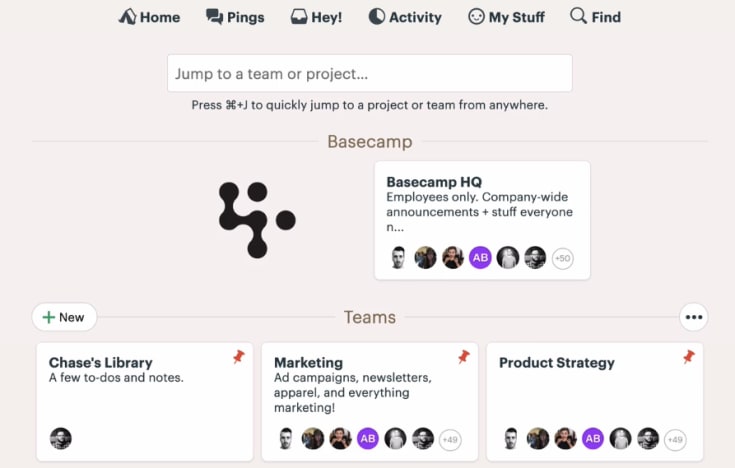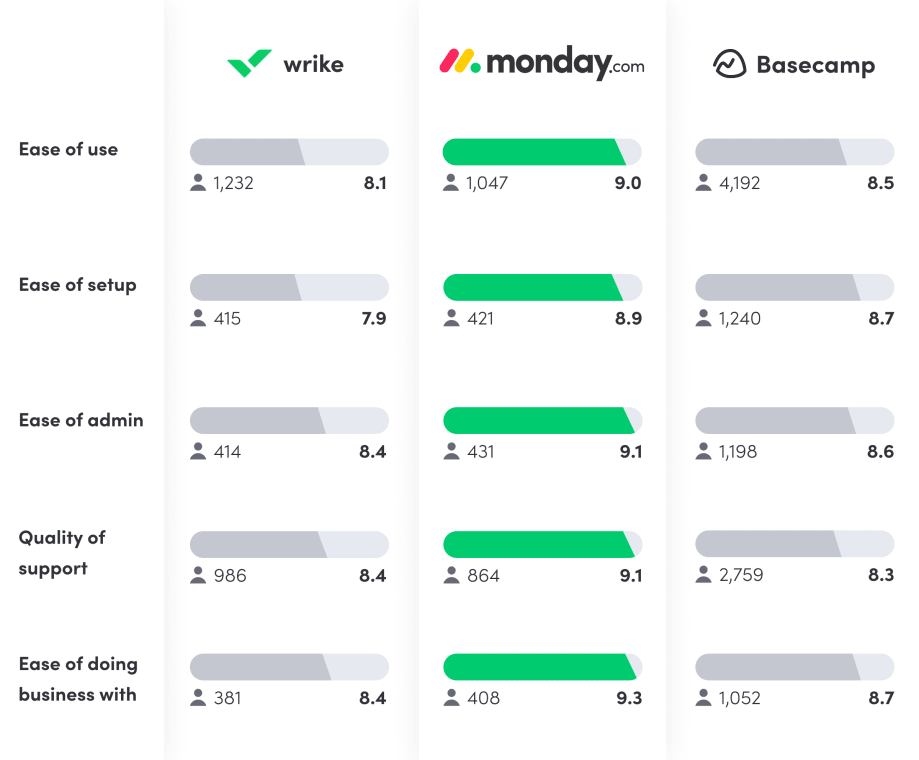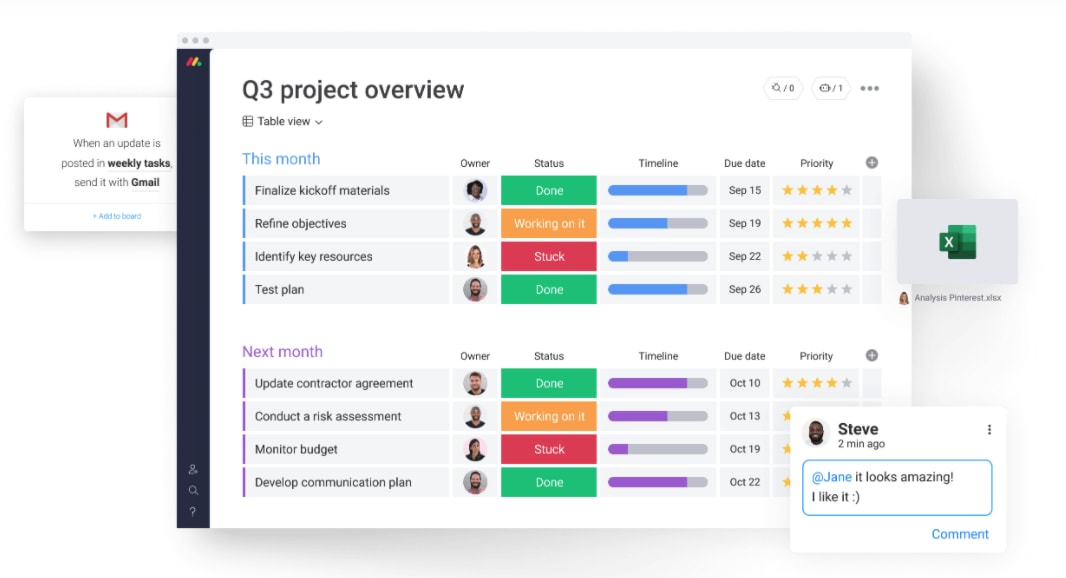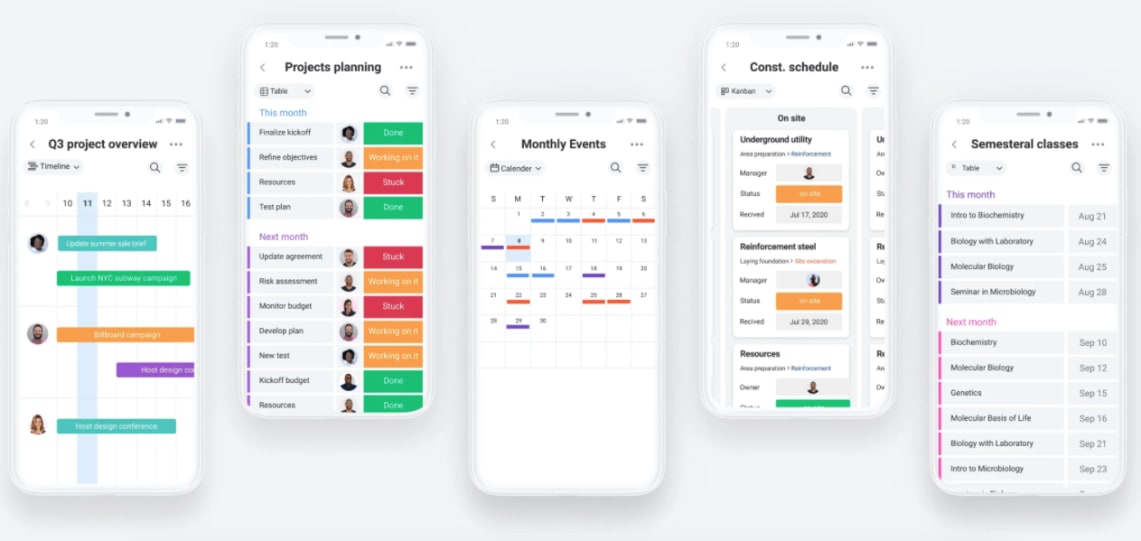Wrike and Basecamp are two of the leading online project management software solutions (among others, like one we made up and called monday.com) on the market right now. And, while they cross over quite a bit in terms of functionality, there are some important hairs to split that could make one much better than the other for your team’s needs (or neither!)
Do these differences matter for the average team or is it a case of personal preference? Is one clearly superior to the other? Is there perhaps a third alternative that beats them both? In this article, we’ll compare these well-known tools and offer a look at monday.com for some food for thought.
What is Wrike?
Wrike is a project management tool out of San Jose, California that’s designed with productivity and team collaboration in mind.
They put a respectable focus on customization, allowing organizations to tailor their digital workspaces to meet the specific needs of the project and/or teams.
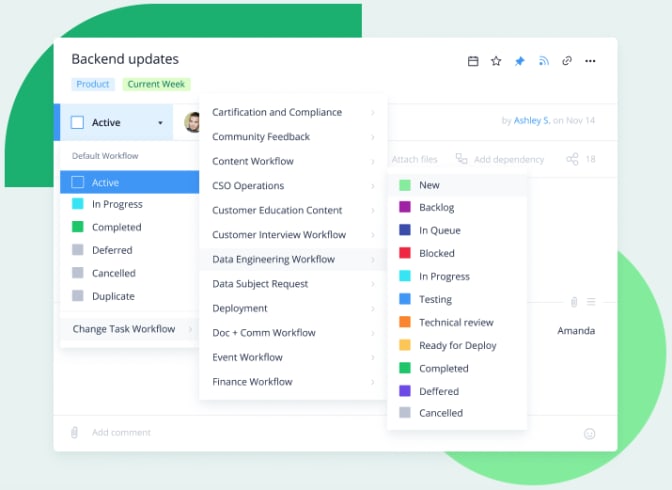
It’s worth noting that Wrike is more of a pure-play project management platform, so the question we will try to answer for you today is — given the slimmer focus, does Wrike justify its price plans?
What is Basecamp?
Basecamp is a project management platform that’s just entered its 21st year of operation, meaning it can now legally purchase alcoholic drinks. Congrats, Basecamp — go easy! Basecamp’s main point of differentiation is its commitment to unifying all the elements of a project into one central location.
A ‘base’ of operations, if you will (we now understand how they discovered their name).
Does Basecamp’s 20-year tenure in the project management space translate to a better overall product? Let’s see how the competition stacks up…
Wrike vs. Basecamp — key differences
TL;DR — Basecamp is a full-suite platform, whereas Wrike’s functionality is limited mostly to project management functions plus external integrations. monday.com, for comparison purposes, is a complete Work OS with 24/7 customer support and budget-friendly options!
To make the best possible decision, you should clarify your needs by asking a few of the following questions:
- How big is my team?
- What’s my budget?
- How important is simplicity in our operations?
- How invested are we in other software service applications?
- How important is security in our chosen platform?
- What are our storage needs?
- What do our clients use?
Keep those answers in mind as we head over to the next section, which compares the core features of each platform for your evaluative pleasure. Explore monday.com’s features now.
Wrike features
As we mentioned before, Wrike prides itself on customizability. You can create custom dashboards that suit your organizational needs and design team-specific automation processes. Plus, all actions in Wrike are executed and updated in real-time.
Wrike offers built-in time tracking, which we think time tracking is important, and therefore offer it too!
Basecamp features
Within Basecamp you’ll find tools for messaging, real-time chat, to-do lists, schedules, and ‘check-ins’. Speaking of money, let’s take a look at how pricing stacks up.
How much do Wrike and Basecamp cost?
Both have limited-use free plans. Basecamp only has 1 paid option with all the features, Wrike has 4 options depending on your needs. monday.com has the most affordable paid option.
Now that you understand their main features and selling points, it’s time to see which platform offers the greatest bang for your buck.
Wrike plans and pricing
Wrike offers 4 price plans charged on a per-user, per-month basis.
- Free: Maximum of 5 users, basic board-view for task management and file sharing with a storage capacity of 2GB. Google Drive, Dropbox, Office 365, and One Drive can integrate under this plan.
- Professional, $9.80/user per month: Available for 5, 10 or 15 users, with all the free features plus sub-task management, shareable dashboards, MS Projects, Excel, and RSS integrations, and more. 5GB storage capacity.
- Business, $24.80/user per month: For 5–200 users, with all the Professional features plus custom fields and workflows, time-tracking, report templates, branded workspaces, and more. 50GB storage capacity
- Enterprise, tailored pricing: Unlimited users, all Business features plus advanced security and controls, business intelligence integrations, and more. 100GB storage capacity.
Basecamp plans and pricing
Basecamp’s pricing structure is a little simpler, with two plan options available, paid on a flat monthly basis.
- Personal, Free: Up to 3 projects, 20 users, and 1GB storage capacity.
- Business, $99: Unlimited projects and users, 500GB storage capacity, company HQ, project templates, priority support, and more.
So, Wrike allows for more flexibility in their pricing plans, but Basecamp does have a more generous free option. But, we should mention that neither option beats monday.com’s pricing when it comes to value for your money.
Wrike features and advantages over Basecamp:
To put it as simply as possible, Wrike has more in-depth functionality and in-product features than Basecamp.
For example, in Wrike you can manage resource allocation in your project monitoring dashboard. You can create dependencies for certain tasks, and issue mass updates to entire teams. Additionally, Wrike has a well-rated project budgeting feature.
Basecamp features and advantages over Wrike:
Larger organizations highly regard the ‘scheduling’ tool in the resource management function of Basecamp, suggesting that it’s easier to manage time efficiently on Basecamp in big, multi-level businesses.
More so, if you’re a fan of stripped-back dashboards and ‘plug-in and play’ simplicity, Basecamp will probably be your preferred choice due to its lack of customization options.
What about customer service?
Wrike offers a ‘deployment service’ from expert consultants to help you start using the dashboard, streamlining your projects, and utilizing automation. They promise that this will help overcome the adoption barriers that can appear using their service. They also provide support through the traditional methods of email, chat, and phone; however, they don’t list any response-time guarantees or estimated waiting times.
Basecamp allows you to submit written queries about any issues you may have to human support teams. They suggest that they can get back to you in ‘about’ 30 minutes, though this is indeed subject to change. To tell you a secret, you probably won’t need to use monday.com’s support teams, the darn thing is so simple and intuitive to use. If you do however, we’ve managed to get our 24/7 support response time down to just 7 minutes. 30 minutes feels awfully long now, huh?
How are their customer reviews?
We understand that there may be a touch of bias involved in us reviewing these platforms ourselves. So, let’s take that out of the equation and have a look at what impartial software service review company G2 has to say.
Wrike scores 4/5 stars from 1,320 reviews
Wrike manages an impressive 4 stars, with notably high ratings for their Project Budgeting feature and Dashboard. They beat Basecamp in ratings for 11 out of 14 comparable features. But…
Basecamp scores 4/5 stars from 4,528 reviews
While they both boast an identical score of 4 stars, Basecamp’s score comes from a significantly greater pool of user reviews, making it more trustworthy. However, they beat Wrike in only 3 out of 14 comparable features, and these features are scheduling, calendar view, and To-Do lists.
Is there a third company with a better score?
Uh oh, who’s that coming over the horizon? Why, it’s monday.com of course, and it looks like they have an average review score of 4.6 stars with 1,250 reviews on G2!
That’s right. And out of 23 comparable features, monday.com beats Wrike in 15 of them.
We also manage to top Wrike and Basecamp in every single one of the user-dimensions, which include (but are not limited to) ease of use, ease of setup, quality of support, and product direction.We hate to toot our own horn, so we let our customers do it for us.
So, which is it? Wrike or Basecamp?
If only there was a project management platform that combined the appeal of a clean visual interface and intuitive controls of Basecamp with the technical depth and customization options of Wrike. By the way, allow us to formally introduce ourselves. We’re monday.com — the project management digital workspace that manages anything.
Why monday.com?
With monday.com, you can find everything you need to manage from giant projects to tiny tasks on one clean-looking board, or ‘visual super table’ as we sometimes call it.
We have 200+ templates based on a wide variety of project and workflow types to make getting started a cinch. To suit the visual preference of every kind of user, we allow 8 different types of data visualizations including Kanban, timeline, Gantt, and more.
You can stay up to date with your team on any device, and the dashboard is just as gorgeous on iOS and Android as it is on the computer.
And you can do all of the following useful things:
- Intelligent automations for routine tasks
- Use 40+ integrations from third-party apps
- Advanced file-search for your whole file directory
- Get access to support 24/7
- Download ready-made monday.com Apps in the app marketplace
- Receive data-driven insights about your team’s performance
- Feel secure with enterprise-level data security
Prioritize the tool with the best features
When it comes down to Wrike vs Basecamp, it’s a close race. The winner ultimately depends on whether you’re looking for simplicity or customization. If you want the best of both worlds, check out monday.com. Our Work OS is intuitive yet entirely customizable. So no matter what you need, we can help you get your work done better.
Related articles: Wrike vs monday.com, Wrike vs. Asana, Smartsheet vs. Wrike, Wrike vs. Jira, Wrike alternatives, monday.com alternatives
Check out our free project timeline template and discover just how easy it is to tackle work in a whole new way.

